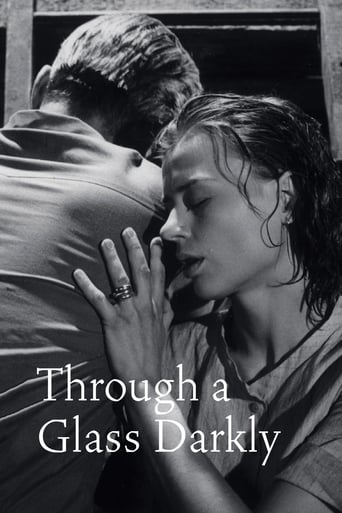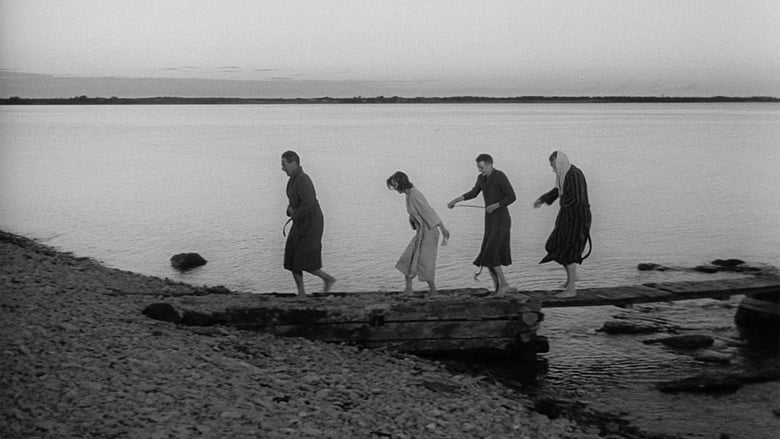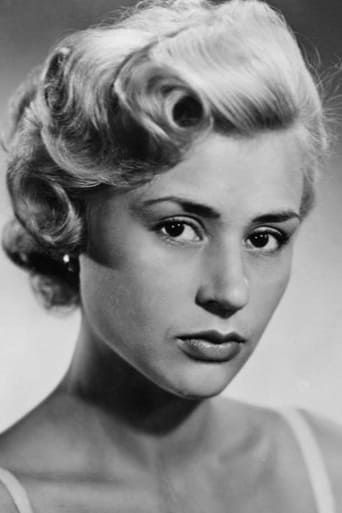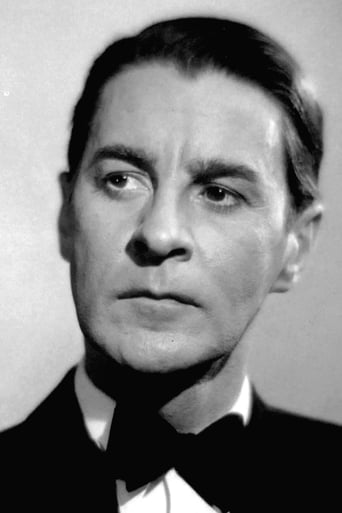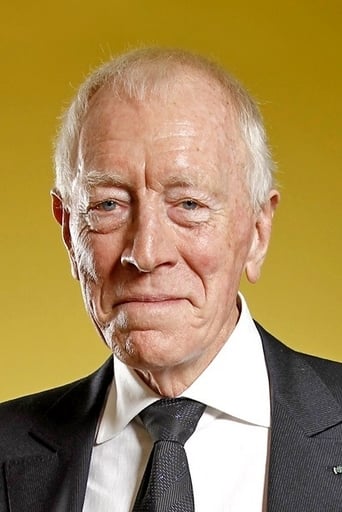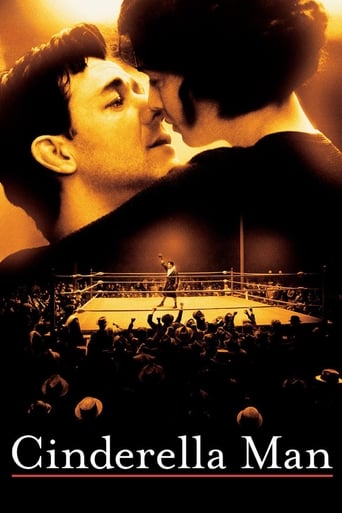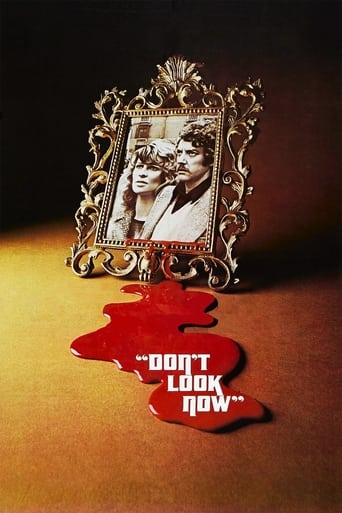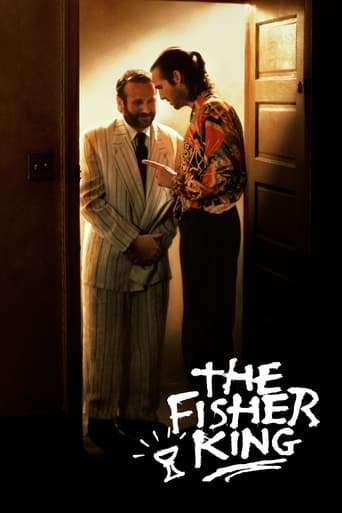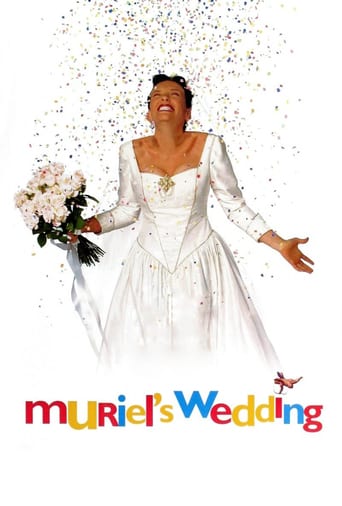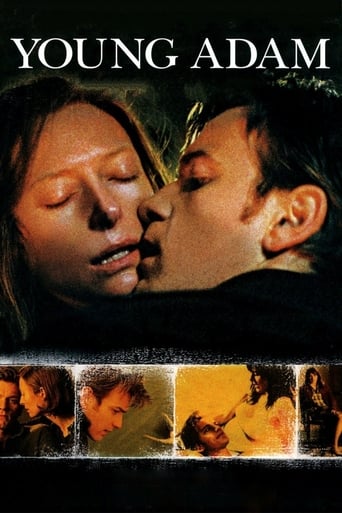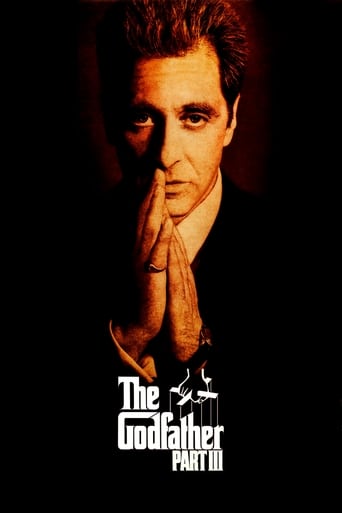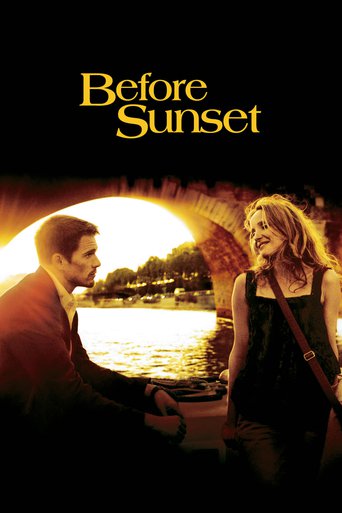Through a Glass Darkly (1961)
Karin hopes to recover from her recent stay at a mental hospital by spending the summer at her family's cottage on a tiny island. Her husband, Martin, cares for her but is frustrated by her physical withdrawal. Her younger brother, Minus, is confused by Karin's vulnerability and his own budding sexuality. Their father, David, cannot overcome his haughty remoteness. Beset by visions, Karin descends further into madness.
Watch Trailer
Free Trial Channels
Cast


Similar titles
Reviews
Too much about the plot just didn't add up, the writing was bad, some of the scenes were cringey and awkward,
Fun premise, good actors, bad writing. This film seemed to have potential at the beginning but it quickly devolves into a trite action film. Ultimately it's very boring.
All of these films share one commonality, that being a kind of emotional center that humanizes a cast of monsters.
It is encouraging that the film ends so strongly.Otherwise, it wouldn't have been a particularly memorable film
. . . during the 1912 Stockholm Olympics ("What this country needs is a good 10-round semi-automatic") is given a lot of credence during THROUGH A GLASS DARKLY. With a second-generation psycho chick in the family who initiates her gay younger brother into the World of Boy-Girl Sex after being raped herself by a cold-eyed Spider God, viewers will wonder where this household has misplaced all of their firearms. For instance, when "Karin" opens Daddy's desk drawer, does she find something useful, like a .45? Nope, all she plucks out is his diary! While Karin's dad, husband, and younger brother (three DIFFERENT guys, since you never know with a Swedish flick) take turns crying and sobbing in hopeless despair at the quartet's vacation cottage, there doesn't seem to be as much as a .22 rifle on hand to smooth out this clan's boring dysfunction. "Scandanavian" countries such as Sweden are constantly making fun of America's gun-play death rate (even though Norway boasts the current World Record Champ for a shooting iron killing spree). However, DARKLY illustrates the kind of sick agony that results when family disputes cannot be resolved the American Way.
My third outing with Ingmar Bergman brought me to the beginning of his famed "religious trilogy". Through a Glass Darkly was released in 1961 and examines a woman's mental illness, a young man emotionally starved of his father's love, and the grief of losing someone you love and how helpless one feels in that situation. An emotional exploration of love and loss and a family left grasping at whatever pieces of their relationship are left. Visually gorgeous as it is stark, Through a Glass Darkly rakes the audience over the coals of its pensive intensity yet leave you safely in the warmth of its lyrical beauty.Returning home to his family island, self-absorbed writer David (Gunnar Björnstrand) is reunited with the son he often ignores, Minus (Lars Passgård), his daughter, Karin (Harriet Andersson) who has just been released from a mental institution, and her devoted yet frustrated husband Martin (Max von Sydow), David can't shake the feeling of regret that his children are such strangers to him. Minus will do anything to get his father's attention yet he never seems to be able to obtain it. Karin, conversely, only has her father's attention because of her mental instability and would much rather David ignore her as he does her brother. Warned by Martin of a possible relapse of Karin's mental condition, David attempts to be more of a father to his children as they spend time together on the island monitoring Karin. David didn't just retreat to get more writing done, however, in fact, he abandoned his children after the death of their mother, rendering their reunion awkward and emotionally cold. Martin, devoted as he is to Karin's well being, has also grown frustrated acting as the constant caregiver and little else due to Karin's diminished sexual yearnings. Their time together is filled with emotional distance and hostility culminating in Karin's discovery of a journal of her father's in which she discovers that her illness is degenerative and without cure triggering a breakdown that will test each person on the island. From the opening shot, Bergman creates an intensely atmospheric mood filled with grim overcast skies matching the feelings of the family members to one another. Another possible theme I'm beginning to notice during my fourth outing with Ingmar Bergman is the use of theatre and acting within his films. Judging by what is shared when his characters are on stage, it seems as though Bergman may have felt as though acting is when an individual is most honest with themselves and those around them. I am interested to see if this is a theme that persists as I travel through the rest of Bergman's filmography. Through a Glass Darkly is unique because it is a strong emotional film that is wrapped in such beauty it quells the notion that this is simply a "depressing Ingmar Bergman film". The technical aspect that stuck out to me most during this film was the precision with which each shot was framed. There is not a shot wasted or a position that is anything but calculated perfectly illustrating the deteriorating mental conditions unique to each family member on screen.
The first film in director Ingmar Bergman's "faith trilogy" - to be completed several years later with "Winter Light" (1962) and "Silence" (1963) - "Through A Glass Darkly" (1961) stars Harriet Andersson as Karin, a young woman who suffers from a mental illness. This illness resembles schizophrenia, but Bergman cruelly calls it "the disease of faith", a symptom of Karin's theism.Karin habitually sees visions of God, but her visions are warped to the point of parody. Her God takes the form of a salacious spider, and later a helicopter which ferries her sputtering body to a mental hospital. Supporting the increasingly deranged Karin are three men: Karin's brother, husband and father. These men embody three very different approaches to "spirituality" or "love", each of which is contrasted with Karin's more Christian outlook. The father, for example, is a cynic, depressive and writer, and is increasingly detached from a family he loves only insofar as they provide material for his increasingly morbid novels. The husband, in contrast, is a man of science, but his rationality proves unable to cure his wife. Meanwhile, Karin's brother is a naive, budding play-write, who develops an incestuous, sexual attraction toward her. As with Bergman's other "faith" films, Karin's beliefs are mocked for being hollow and borne of delusions, but shown to be far less horrific than those of the apathetic, post faith characters who surround her.The film ends with a macabre parody of romantic, spiritual and familial love. Here, Karin's embrace by God is ushered in by incestuous sex with her brother. An angelic helicopter then lifts her, not up into heaven, but toward a psychiatric ward. Afterwards, Karin's father tells his son that the family's love for one another is proof enough of the existence of God. His words are a self defence mechanism, designed to assuage the pain of watching his family disintegrate. The son, so starved of affection and attention, then accepts the father's drivel. By the film's end, Bergman has shown not only how a love of God is often the displacement of the love we should show for one another, but how even the staunchest unbelievers summon "Gods" to bolster their fragility.Like "Through A Glass Darkly, "Winter Light", the second film in Bergman's trilogy, takes place in a cold, remote part of Sweden. Bergman's tone is austere and chilling throughout, all skies, oceans, rivers, buildings and vistas seemingly bleached and robbed of all depth. Attuned to this suffocating "nothingness" is Tomas Ericsson, a village pastor (named after Bergman's own father, a priest called Erik) who has lost his faith but continues to tend to his dwindling congregation. If Bergman's "faith trilogy" traces a movement away from shaky belief to profound existential abandonment, then "Winter Light" represents the mid-point of this journey: shaky disbelief, God's light wintry, wispy and uncertain.And so Bergman paints Tomas as a man of, not only uncertainty, but contradictions. Tomas uses his position of "divine authority" to absolve himself of blame when one member of his congregation commits suicide, whilst using his certainty that God doesn't exist, and therefore also absolute morality, as an excuse for his treatment of several woman. But the problem, the film goes on to show, isn't that God does or does not exist, but that he has always been summoned and shunted aside whenever it best suits man."Winter Light" ended with two atheists in a church, waiting for God to speak. The silence that greets them becomes the basis of Bergman's "The Silence", arguably the greatest film in his trilogy (and the precursor to his traumatising "Cries and Whispers"). Making heavy use of sound effects and little use of dialogue, the film centres on Anna, Ester and Johan, a young boy. Whether these characters are related (Lovers? Family? Friends?) is never clarified.It isn't long before Bergman is alluding to off-screen wars (expressionistic shots of tanks and war machines) and the on-screen mortality of his characters (Ester coughs blood; she's dying from Tuberculosis), all forms of human suffering which for centuries have cast doubt on the existence of God. The rest of the film then largely takes place in a hotel, which Johan explores whilst Ester remains ill and bed bound. During his explorations he will stumble across various mundane yet disturbing sights and sounds. Think the fan which is placed at Ester's bedside, ostensibly for her comfort, but with each blade spin being a reminder of helplessness. Meanwhile, the click of Johan's toy pistol echoes shadowy military vehicles, whilst typewriters and clocks sing songs of death, each tick-tock bring one closer to oblivion. There's a certain, sickening "finality" to "The Silence's" "noise".Most horrific, though, is the disguised contempt these characters have for one another, despite their seemingly unwavering love. Ester despises Anna for her good health, for the carnal pleasures she indulges in, whilst Anna apathetically views Ester as a constant inconvenience. It's a love-hate tug of war which little Johan is being indoctrinated in.And so more horrific than God's silence is our own silence, our inability to both truly connect with another human being, and to know completely what the other is thinking. Despite Ester and Anna's rituals of human connection, they remain forever apart and forever alone. Ester herself represents the "Mind", a figure of intellect and rationality (linked to Bach, is multilingual etc), while Anna represents the "Body", Bergman stressing her bodily routines (bathes, eats, sex, is facile etc). What the film shows is that Pure Reason eventually withers the body, whilst carnality, unennboled by reason, ultimately leads to similar self destruction. Bergman's cure is the film's final word: "spirit". He closes on a powerful shot of Johan, the boy's future, and dilemma, ours.8/10 – Worth one viewing. The trilogy's cinematography, by Sven Nykvist, suffocates.
With his distinct filming, frequent use of close-ups and through four characters functioning as mirrors to one another Ingmar Bergman (1917-2007) gives thorough depictions of relationships between a father and a daughter, a father-in-law and a son-in-law, a husband and a wife and a sister and a brother. His stringently structured drama is played out during a summer day on an isolated Island surrounded by grand landscapes, where four related characters are misled by a God who has only given suggestions about his presence to the suffering main character, and is a study of character about a woman seeking comfort in her visions of God appearing before her and of a father fighting against his desires to use his daughter's mental regression in his novel.In one of the film's most memorable scenes Ingmar Bergman films the main character as she is in God's possession and placed in the middle of a minimal furnished room where she's surrounded by shadows and light. This particular scene personifies the expressive power of living images and the birth of a magic scene. This August Strindberg-inspired and dialog-driven chamber-piece is masterfully photographed by Swedish cinematographer Sven Nykvist (1922-2006) in black-and-white and incomparably acted by then 18-year-old Lasse Passgård, Max Von Sydow, Gunnar Björnstrand and especially Harriet Andersson who is unrestrained in her portrayal of her character's versatile emotional range.God's character in this existentialistic study of religious madness which is strongly influenced by Johann Sebastian Bach's atmospheric chamber music, manifests in the brilliantly portrayed light and darkness which is a pivotal aspect in this visionary director's universe.

